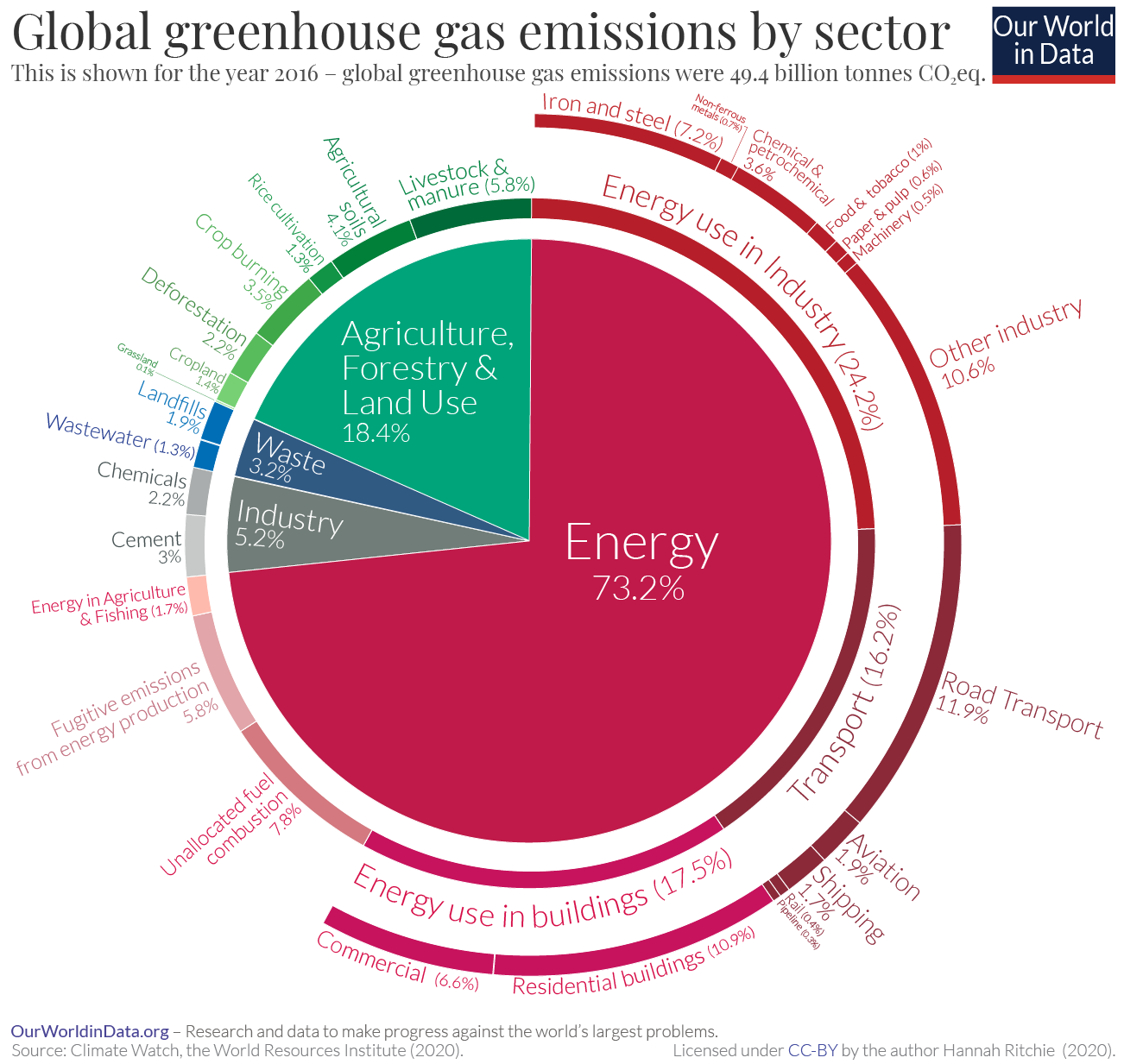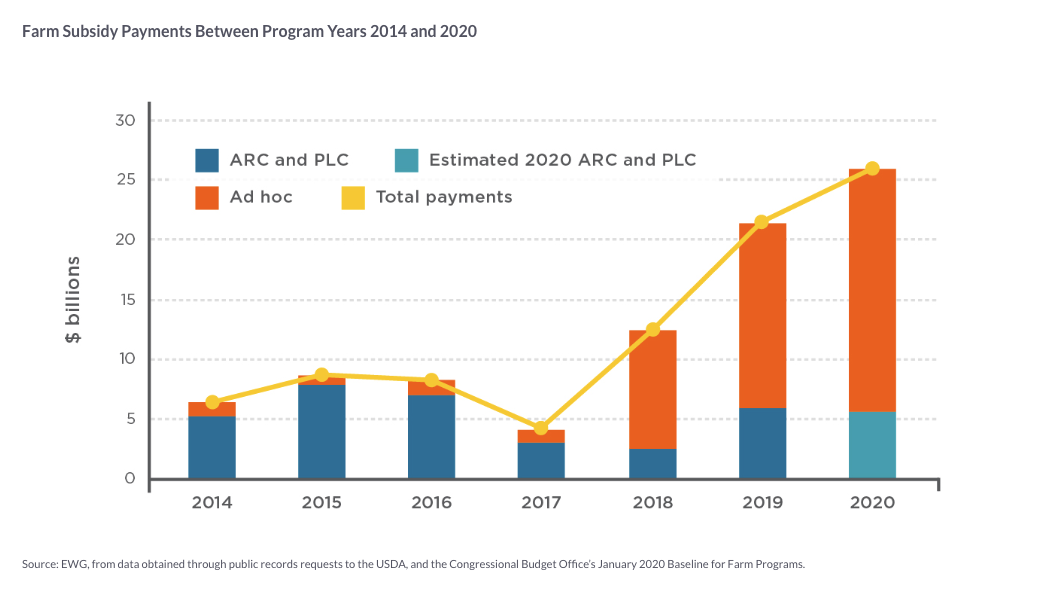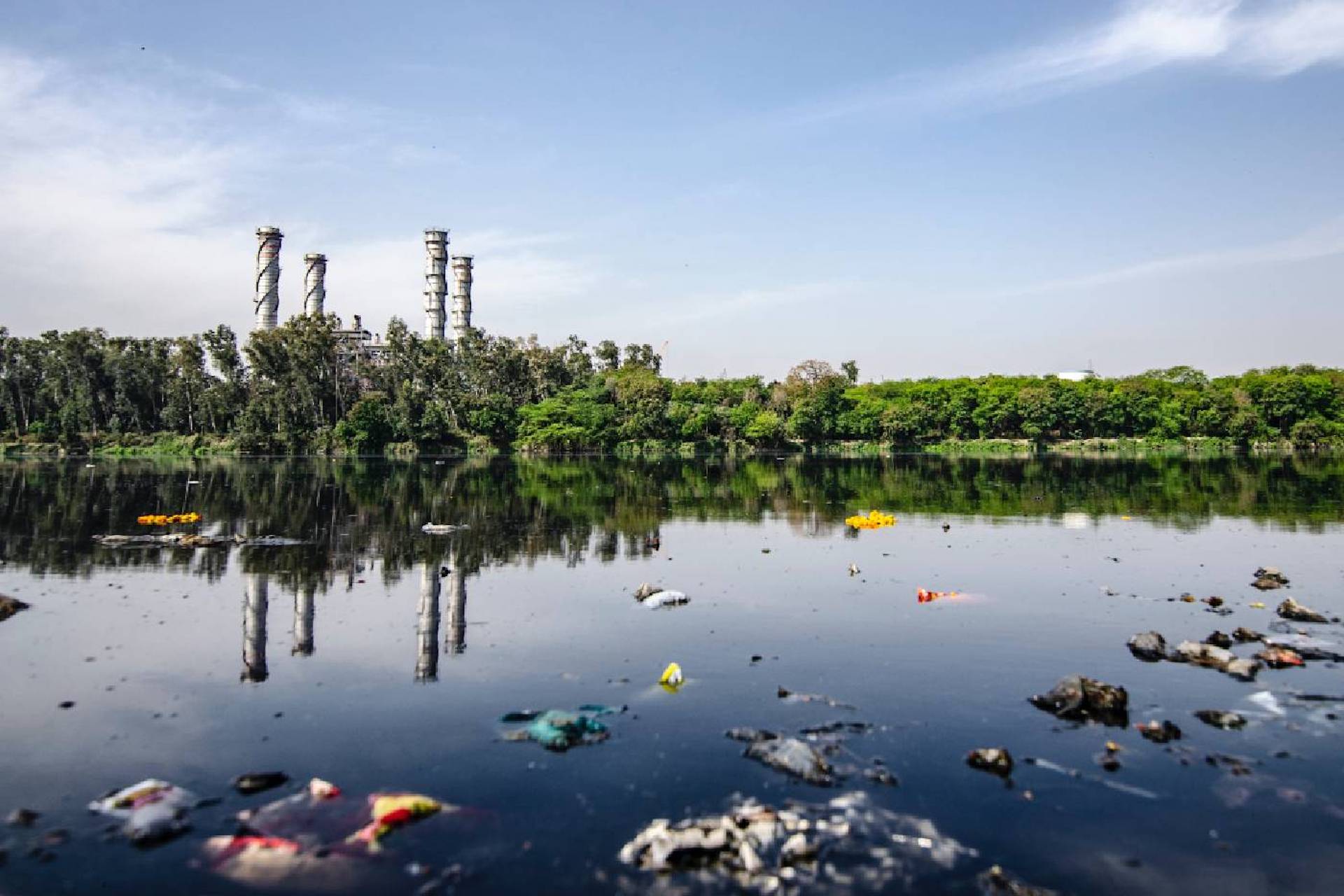PART VI _ It is well known that greenhouse gases (GHGs) trap heat within Earth’s atmosphere and warm the planet.
In a few decades, GHGs—chiefly in CO₂ emissions—have risen at unprecedented rates due to global growth and resource consumption.
Our World in Data illustrates the significant sectors where these emissions originate, using 2016 data courtesy of Climate Watch and the World Resources Institute which showed total emissions reached 49.4 billion tonnes of CO₂ equivalents (CO₂e).

According to this research, global GHG emissions can be roughly traced back to four broad categories: energy, agriculture, industry, and waste. Overwhelmingly, almost three-quarters of GHG emissions come from our energy consumption.
The World Health Organization (WHO) reports that climate change is responsible for at least 250,000 additional deaths per year, between 2030-2050. The effects of pollution-induced climate change can cause:
- Increased incidents of infectious disease
- Heatwaves
- Loss of agricultural productivity
- Increase respiratory disease
- And more
Additionally, the WHO estimates that 4.2 million people die prematurely each year from outdoor air pollution, and another 3.8 million die from indoor air pollution.
To change this trajectory, we must address the root cause—our global reliance on and consumption of goods and services from industries driving greenhouse gas emissions.
Taking concrete steps in key areas can help combat climate change, save lives, and secure a sustainable future in line with the 2030 Sustainable Development Goals.
Decarbonizing Supply Chains and Implementing Circular Economies
Today, about 45% of global greenhouse gas emissions come from product use, manufacturing, and food production. Global use of resources has tripled since 1970 and could double again by 2050 if business continues as usual.
Now, governments, regulators, investors, and customers increasingly demand that business play their whole part in global efforts to tackle climate change.
More than 200 experts from 100 organizations have helped develop the Circular Economy Action Agenda, a set of publications that analyze the potential impact of implementing the principles of circular economy in key sectors. The Action Agenda demonstrates five opportunities associated with the shift to a circular economy that contributes to the greater general welfare and intrastate commerce opportunities, including:
- Making better use of finite resources and reducing food waste
- Reducing emissions
- Protecting health and biodiversity
- Boosting economies - Research shows that the circular economy offers a $4.5 trillion economic opportunity by reducing waste, stimulating innovation, and creating employment
- Creating more and better jobs
Decarbonizing supply chains and embracing the principles of circular economies can help create a more sustainable future. Circular economy strategies that reduce the use of resources can cut global greenhouse gas emissions by 39% (22.8 billion tons) and play a crucial role in averting the dangerous impacts of climate change.
By embedding circular principles into the fabric of our economic systems, we can usher in an era where products are designed with reuse, refurbishment, and recycling in mind, thus extending their lifecycle, significantly reducing waste, and enhancing the general welfare of all.
Enabling global, regional, and local progress towards environmental sustainability is an imperative task for the well-being of our planet and future generations. One pivotal aspect of this mission is exercising better control over health hazards like burning fossil fuels, managing nuclear waste, and the proliferation of various pollutants.
The consequences of these environmental stressors are dire, leading to severe health issues such as lung cancer, kidney disease, and asthma. By curbing these hazardous practices, we protect the health of individuals and safeguard our planet's overall health.
Environmental Conservation and Resource Management
In the face of escalating climate change, addressing environmental conservation and resource management can help combat climate change, protect our forests, and secure a sustainable future.
Reduce Deforestation and Illegal Logging through Transparency and Regulation
Illegal logging and deforestation devastate forests and exacerbate climate change. In the quest for valuable timber, ruthless loggers decimate pristine woodlands, leading to biodiversity loss, soil erosion, and increased carbon emissions. Unified regulations and greater transparency can help combat the issue.
For example, the Amazon Rainforest, often called the "lungs of the Earth," has faced relentless illegal logging. However, nations like Brazil have recently tried to crack down on illegal logging activities. By implementing satellite technology and stricter enforcement, they've made significant strides in curbing this destructive practice and preserving vital ecosystems.
The European Union has also taken significant steps to combat illegal logging through the EUTR. This regulation prohibits the placement of illegally harvested timber and timber products on the EU market, compelling companies to trace the origin of their wood products. By doing so, the EU is reducing illegal logging and curbing the environmental and social harm associated with it.
Implement Land Conversion Controls
Controlling land conversion is also vital to prevent deforestation. When forests are cleared for agriculture or urban development, the carbon stored in trees is released into the atmosphere, contributing to global warming. Preserving our forests is essential for absorbing carbon dioxide and safeguarding biodiversity.
Indonesia—which home to vast tropical rainforests—implemented a forest moratorium to control land conversion. They aim to reduce emissions and protect their unique ecosystems by designating areas where deforestation is restricted. Initiatives like this demonstrate how responsible land management can substantially impact environmental conservation.
Embrace Eco-Forestry
Eco-forestry practices offer a promising solution that promotes sustainable timber production and prioritizes biodiversity conservation. It's a win-win for our environment and economy, showing that responsible forestry management can drive environmental preservation.
The Forest Stewardship Council (FSC) certification is a shining example of how eco-forestry can thrive. FSC-certified products come from responsibly managed forests, ensuring that timber is harvested sustainably, ecosystems are protected, and local communities benefit economically. By choosing FSC-certified products, consumers play a vital role in supporting eco-forestry practices and the preservation of forests worldwide.
Environmental conservation and resource management through greater regulation and transparency are vital actions needed to combat climate change and preserve the planet.
Sustainable Agriculture and Conservation
As we confront the pressing challenges of climate change and environmental degradation, sustainable agriculture and conservation take center stage. It's not just about addressing these issues but redefining how we interact with the planet.
Tackle Food Waste through Improved Production Control
Reducing food waste starts at the source and is a pressing concern. The world produces enough food today to feed everyone on the planet, yet millions go hungry while vast amounts of food are wasted. Better control of food production processes can drastically cut waste, conserve resources, and ensure more people have the necessary sustenance.
The "ugly" produce movement is a prime example of how improved production control can make a difference. Though perfectly edible, many fruits and vegetables are discarded due to their appearance. However, several companies and initiatives have recently begun championing the use of "imperfect" produce in various food products, thereby reducing waste and providing affordable food options to consumers.
Achieve Net-Zero Chemical Use for Agriculture
Transitioning to eco-friendly agricultural practices is imperative. The heavy use of chemicals in farming harms our soil, water, and ecosystems and contributes significantly to greenhouse gas emissions. Achieving net-zero chemical use is not just an environmental win; it's a crucial step towards a sustainable future.
Denmark is setting an inspiring example in sustainable agriculture. Through organic farming initiatives, they've reduced chemical pesticide usage and adopted practices that promote biodiversity and healthier soil. This shift benefits the environment and yields economic advantages by producing high-quality, sustainable food products.
Sustainable agricultural production and conservation are not just ideals but are actionable solutions to combat climate change, reduce waste, and protect our planet's precious resources.
Re-Balance Agricultural Subsidies in Favor of Small Eco-Friendly and Organic Farmers
According to the Environmental Working Group (EWG), taxpayer-funded farm subsidies have long favored the wealthiest farmers and landowners. But under recent administrations, even more money went to the most prominent and wealthiest farms, further shortchanging smaller, struggling family farms.
EWG’s analysis of the Department of Agriculture records finds that subsidy payments to farmers ballooned from just over $4 billion in 2017 to more than $20 billion in 2020 – primarily driven by ad hoc programs meant to offset the effects of a failed trade war.

To encourage more equitable and sustainable farming practices, we must:
- Change farm subsidiary programs to target small, eco-friendly, and minority-owned farms to increase farming among Black, Latino, and Asian American farmers,
- Increase funding for conservation programs that encourage adopting sustainable practices to reduce greenhouse gas emissions.
Climate Change Mitigation and Sustainability
In the race to combat climate change and secure a more sustainable future, climate change mitigation and sustainability can offer a roadmap to a world that thrives in harmony with the environment, thus safeguarding our planet for future generations.
Develop Circular Economies for Greater Sustainability
Building sustainable solutions through circular economies is a game-changer in our quest for long-term sustainability. This approach seeks to reduce waste, minimize resource depletion, and reutilize materials efficiently, creating a regenerative economic system.
For example, The Ellen MacArthur Foundation has championed the circular economy concept, inspiring businesses and governments to rethink their practices. Additionally, brands such as Patagonia and Loop have embraced circular strategies, recycling, and repurposing products to reduce waste. By creating closed-loop systems, they reduce their environmental footprint, cut costs, and increase profitability.
Establish a Feedback Loop for Carbon Emissions
Accounting for carbon emissions accurately is not just important; it's essential. A robust feedback loop enables us to monitor and reduce emissions effectively. It's a critical tool in our arsenal to combat climate change.
California's Cap-and-Trade Program is a shining example of an effective feedback loop. By placing a cap on emissions and allowing companies to buy and sell emissions allowances, the program encourages businesses to reduce their carbon footprint. Over the years, it has helped California significantly reduce emissions while generating revenue for clean energy projects.
Enhance Funding for Clean Energy Transition
Sustainable energy sources are the linchpin in the fight against climate change. Supporting innovation and development in clean energy technologies can reduce global reliance on fossil fuels and pave the way for a greener future.
Governments can influence energy policies by levying taxes on pollution emitters and providing incentives and disincentives for transitioning to clean energy.
The remarkable growth of solar power is a testament to the importance of funding clean energy. Countries like Germany have incentivized solar panel installations through feed-in tariffs, spurring a solar energy revolution. Solar power reduces carbon emissions, creates jobs, and strengthens energy security.
Enforce the Nagoya Protocol to Protect Developing Countries
To preserve biodiversity and promote equitable access to genetic resources, strict enforcement of the Nagoya Protocol is not just essential; it's a moral imperative. This international Agreement ensures that the benefits of using genetic resources are somewhat shared between provider and user countries, particularly benefiting developing nations.
Costa Rica serves as an inspiring model for Nagoya Protocol implementation. The country has established clear regulations for accessing its biodiversity and has negotiated benefit-sharing agreements with researchers and companies. This approach preserves Costa Rica's unique ecosystems and supports sustainable development efforts.
These actions are pivotal in our global commitment to preserving the planet's precious ecosystems and promoting equity among nations. By enforcing the Nagoya Protocol to protect developing countries, strengthening regulations to combat illegal logging, and funding the green energy transition, we can make strides toward a more sustainable future for all.
Addressing Environmental Conservation and Resource Management
To effectively combat pollution-induced climate change, protect our invaluable forests, and secure a sustainable future, we must consider revising or abolishing certain U.S. law exemptions currently afforded to industries whose operations have direct or indirect impacts on the livelihoods of all Americans.
Influenced by lobbying and industry interests, these exemptions create disparities in the legal framework. For instance, industries such as fossil fuels, oil, and gas benefit from exemptions that run counter to the principles of equal application of the law and are out of line with the America's commitment to the 2030 SDGs.
Reevaluating these exemptions and ensuring uniform application of laws such as the Safe Water Act, Clean Water and Air Act, and National Environmental Policy Act can pave the way for a more equitable and sustainable environmental policy landscape.
Furthermore, redirecting subsidies away from unsustainable agricultural practices is essential to promoting resource conservation and responsible management. In this pursuit, overriding U.S. law exemptions is necessary and a fundamental step towards a more harmonious coexistence with the environment.
SUMMARY
As we commemorate Indigenous Peoples' Day today, it is important to recognize the contributions and history of Indigenous peoples and to promote awareness and understanding of the challenges they have faced and continue to face.
The month of October also marks the UN International Day for National Disaster Reduction, a stark reminder of the urgent need for environmental sustainability and effective climate change solutions.
These initiatives not only safeguard our planet but can also bolster our resilience in the face of natural disasters. By embracing green practices, corporate responsibility, and climate change mitigation, we mitigate the impact of disasters and actively work towards a more sustainable and disaster-resilient future. Join us in celebrating this day by contributing to the cause of environmental sustainability and ensuring a safer, more sustainable world for all.
ABOUT READY PLAYER INSTITUTE
Ready Player Institute is a 501(c)(3) non-profit organization addressing disparities in underserved and vulnerable regions, including LATAM, the Caribbean and Pacific Islands.
Their mission is to foster greater diversity and inclusion within research and entrepreneurship, all while harnessing innovation and technology to drive sustainable solutions.
Your contribution to Ready Player Institute through Uprise will directly support individuals from minority backgrounds in underserved regions. These funds will enable them to access essential training and laboratory programs aimed at digitizing tangible assets, improving educational opportunities, advancing healthcare services, optimizing the food supply chain, and addressing the pressing issue of climate change.
Ready Player Institute collaborates closely with Project DARP, Ready Player Infrastructure, and Ready Player Ventures, forming a comprehensive network dedicated to positive change and innovation.
Your support can make a meaningful difference in their efforts to empower underserved communities and drive progress in these critical areas.
🌍 Join Us in Making a Difference! 🌱
Do you have innovative ideas, breaking news, groundbreaking research, or expert insights that can help tackle climate change, environmental pollution, and social inequity? Share your voice with the world and be a catalyst for positive change. Together, we can create a better future!
Contact us today on publishing@readyplayerinstitute.org.










